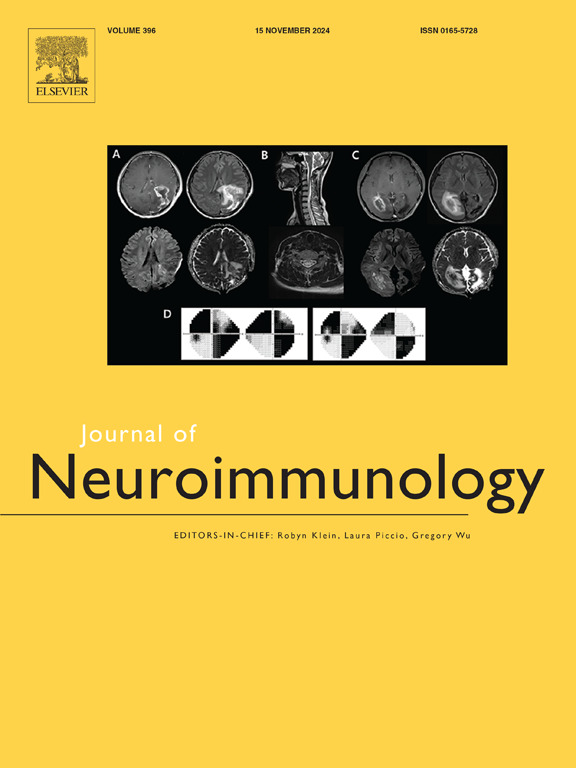d-serine prevents cognitive impairment in a mouse model of NMDAR encephalitis
IF 2.5
4区 医学
Q3 IMMUNOLOGY
引用次数: 0
Abstract
Objective
Despite effective immunotherapy, many patients with anti-N-methyl-d-aspartate receptor (NMDAR) encephalitis continue to have persistent cognitive deficits. This study investigated whether d-serine administration can ameliorate cognitive impairment in a mouse model of anti-NMDAR encephalitis.
Methods
Mice received continuous intracerebroventricular infusions of purified IgG isolated from pooled cerebrospinal fluid (CSF) of patients with anti-NMDAR encephalitis or non-inflammatory controls for 14 days. During the same period, mice were given daily intraperitoneal injections of d-serine or saline. Cognitive function and hippocampal synaptic plasticity were evaluated using a battery of behavioral tests and long-term potentiation (LTP) recordings. Western blotting and immunofluorescence staining were used to evaluate hippocampal NMDAR clustering and activation of the CaMKII/ERK/CREB pathway.
Results
After 14 days, mice infused with patient-derived anti-NMDAR antibodies showed significant memory impairment and reduced hippocampal LTP. These deficits were markedly attenuated by concurrent d-serine treatment. Patient-derived anti-NMDAR antibodies reduced synaptic NMDAR clusters and membrane NMDAR1 expression in hippocampus, whereas d-serine administration produced only a modest, non-significant increase in these measures. In contrast, d-serine significantly restored phosphorylation of CaMKII, ERK, and CREB that was suppressed by anti-NMDAR antibodies.
Conclusion
d-serine effectively ameliorates cognitive impairment induced by anti-NMDAR antibodies, likely by restoring NMDAR-mediated CaMKII/ERK/CREB signaling. These findings support d-serine as a potential adjunct to immunotherapy for patients with anti-NMDAR encephalitis.
d-丝氨酸可预防NMDAR脑炎小鼠模型的认知损伤
尽管有有效的免疫治疗,许多抗n -甲基-d-天冬氨酸受体(NMDAR)脑炎患者仍然存在持续的认知缺陷。本研究探讨d-丝氨酸是否可以改善抗nmdar脑炎小鼠模型的认知障碍。方法将抗nmdar脑炎患者或非炎症对照组脑脊液中分离的纯化IgG连续脑室输注14天。在同一时期,小鼠每天腹腔注射d-丝氨酸或生理盐水。认知功能和海马突触可塑性通过一系列行为测试和长期增强(LTP)记录进行评估。采用Western blotting和免疫荧光染色评价海马NMDAR聚集和CaMKII/ERK/CREB通路的激活情况。结果注射患者源性抗nmdar抗体14天后,小鼠出现明显的记忆障碍和海马LTP降低。同时使用d-丝氨酸治疗可显著减轻这些缺陷。患者源性抗NMDAR抗体降低了突触NMDAR簇和海马膜NMDAR1的表达,而d-丝氨酸只产生了适度的、不显著的增加。相反,d-丝氨酸显著恢复了被抗nmdar抗体抑制的CaMKII、ERK和CREB的磷酸化。结论-丝氨酸可能通过恢复nmdar介导的CaMKII/ERK/CREB信号通路,有效改善抗nmdar抗体诱导的认知功能障碍。这些发现支持d-丝氨酸作为抗nmdar脑炎患者免疫治疗的潜在辅助药物。
本文章由计算机程序翻译,如有差异,请以英文原文为准。
求助全文
约1分钟内获得全文
求助全文
来源期刊

Journal of neuroimmunology
医学-免疫学
CiteScore
6.10
自引率
3.00%
发文量
154
审稿时长
37 days
期刊介绍:
The Journal of Neuroimmunology affords a forum for the publication of works applying immunologic methodology to the furtherance of the neurological sciences. Studies on all branches of the neurosciences, particularly fundamental and applied neurobiology, neurology, neuropathology, neurochemistry, neurovirology, neuroendocrinology, neuromuscular research, neuropharmacology and psychology, which involve either immunologic methodology (e.g. immunocytochemistry) or fundamental immunology (e.g. antibody and lymphocyte assays), are considered for publication.
 求助内容:
求助内容: 应助结果提醒方式:
应助结果提醒方式:


